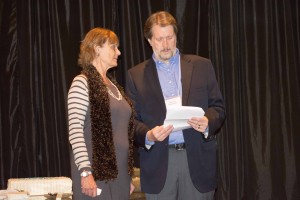Here are some of the highlights of today’s convention:
Claim It, Rename It, or Throw It Out – Steve Brewer
“Your manuscript is not ready – go look at it some more. You owe it to your agent, your editor and your future self.”
“We’re all in love with our books while we’re writing them.”
“Come in late and get out early – all we really want is the drama in the middle.”
“Everything you write teaches you something.”
“If you’ve written the best book you can write, roll the dice. Try to get an agent and sell it in New York.”
“It’s a typical newbie mistake to think of writing a trilogy or a series – just write one freaking book!”
“Write what you want to write, what you’d like to read.”
“Are you eager to start the next book? You’re probably a writer.”
C.A.R.V.E. Your Platform to Snag Agents, Publishers and Readers – Bill O’Hanlon
You have three audiences: the agent, the publisher and the reader.
C = channels. How many places can you get the word out?
- social media connections
- blog views, readers and subscribers
- podcast listeners and subscribers
- email list open and click-through rates
- media appearances and interviews
- public speaking
- partners
- where your book’s audience hangs out or pays attention
A = accomplishments.
- previous publications and sales
- previous media experience
- previous public speaking experience
- academic degrees or positions
- awards
- life accomplishments
- partners
R = relationships.
- within the publishing industry
- other authors, agents or editors
- well-known people for blurbs
- people with large followings for getting the word out
- co-authors
- media people and podcasters
V = visibility.
- regular activities to get your book or yourself seen or heard about
- website visitors
- social media followers and connections
- media appearances
- reviews and bestseller lists
E = evidence. Keep everything to prove your claims.
- take screenshots of Amazon ratings or email lists or followers
- collect records of appearances
- scans or photocopies of reviews
- keep programs from your speaking engagements
- keep previous publications, magazine covers, etc.
- no lying or exaggerating!
Thursday is the Pre-Converence Conference. Today we learned The Anatomy of Engaging Stories (Bill O’Hanlon)
Elements of an Engaging Story:
- Characters – must engage the reader; the reader must identify with the character in some way. Create a mental image of the character with names, appearance, gestures, dialogue, and what other characters say or think.
- Specific sensory details about people, places or actions – use the five senses!
- Action (Plot: beginnings, middles and ends) – the character must be frustrated or threatened or face conflict somehow, must feel called to act or thwarted in his action.
- Scene setting – props and sets; think more Little Theater than Hollywood – go for minimal props and setting (place/time/social)
- Dialogue – bring the reader into the moment
- Vague enough to allow for imagination (let the reader “hallucinate” much of the description)
- Repetition of sounds/theme/elements
- Revisiting the beginning at the end (story arc)
Elmore Leonard used the term “hoppetedoodle” (HOP-tee-doo-dle) to mean too much descriptive detail in a story.
We also had a great lecture about “The Language of Liars,” which is going to be quite useful to me with Chance! Then, it was Tony Hillerman’s 90th birthday party (with cake!), and a chance to see the new educational portal UNM is working on, to take Tony’s legacy to schools and educate young writers.
I’ve spent a lovely three days hob-nobbing with other authors and attending writing panels. Here are some gems from the classes.
- The day I stop learning about my characters is the day I become bored with them — Margaret Coel
- Good beginnings and endings are like good art: I know it when I see it, but it’s awfully hard to define — Jamie McGrath Morris
- One of the biggest dialogue mistakes I see is when all the characters sound alike — Craig Johnson
- Write the kind of novel that, once the reader picks it up, he cannot bear to put it down; not the kind of novel that, once he puts it down, he cannot bear to pick it back up — Margaret Coel
- Before you even sit down to write, know — in this order — what the ending is, and what the beginning will be — Kirk Ellis
- Writing is not a profession, but a vocation. Think bigger than just a contract, a published book. Ask yourself ‘Is this worth one to three years of my life?’ before you begin that novel — David Morrell
- Try this: gather a stack of award-winning novels and read the ending first. Then, read the book to see how the author gets from Point A to Point Z. Do that 500 times. Can you imagine how much you’ll learn about the art of plotting? — Steve Havill
- Here’s a big secret: have someone read your dialogue back to you — Craig Johnson
- ‘Let me tell you a story’ is a very powerful lure — Jamie McGrath Morris
- It’s never as good as it could be. And ‘spoiler alert:’ it’s never going to be — Kirk Ellis
- Become a student of human nature — Craig Johnson
What is the best advice you’ve ever heard from another writer?

